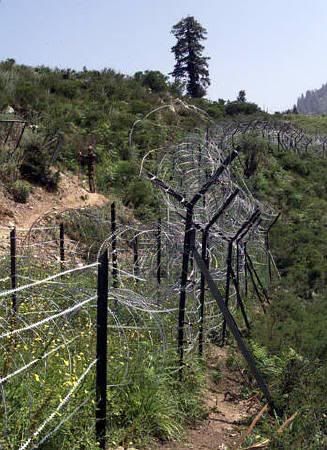All leftists in the world have by now heard of the
"security fence" that Tel Aviv has been building in the West Bank, less a fence than a wall actually, which the International Court of Justice ruled (on July 9, 2004) is
illegal.

Beneath the radar of leftist attention, another fence has been going up -- in Kashmir:
India has been building the fence for about a year, and it is largely completed. It follows the construction of a less politically delicate fence along the India-Pakistan border. It has the symbolic potential, in some eyes, to make the cease-fire line more like an international border, as India desires. . . .
The fence, which breaks only in deference to unconquerable terrain, stands about 12 feet high and is about 12 feet wide. Coils of concertina wire are layered between rows of pickets. Sharp-edged metal tape and, in places, electrification make crossing even harder. So do the soldiers standing guard. "No obstacle in history, whether the China wall or the Maginot line in France, can prevent movement unless there is surveillance," said the governor of the Indian state of Jammu and Kashmir, S. K. Sinha, a former army vice chief of staff.
The fence is part of a larger effort by India to buttress its defenses and uses equipment acquired from Israel, France and the United States, including motion sensors, thermal imaging devices and night-vision equipment. It also has allowed the parceling of the cease-fire zone into a grid system so that officers can be held accountable for movement in designated areas.
In places, the fence has created divisions within a division. Some farmers have been separated from their grazing lands, and a few houses and hamlets that have been in Indian-held Kashmir since 1947 are now outside it because the fence could not be built around them without crossing into Pakistani territory. There are gates for cattle and people, with proper identification, to cross back into India. (Amy Waldman, "Good Fences Make Good Neighbors," New York Times, July 4, 2004)

This July 8, 2004 file photo shows barbed wire fencing constructed by Indian army along the Line of Control (LoC) in Jabri 240 km north of Srinagar. Reuters/Danish Ismail
Though the Indian fence, too, divides villages and creates hardships for farmers separated from their land, and it is likely to make the unfortunate division of Kashmir more or less a fixed fact (at least for the foreseeable future), it must be said that it is built on the Indian side of Kashmir, unlike the Israeli apartheid wall that expropriates even more
land and
water from Palestinians than before.
Unlike the Israeli barrier, which eats into Palestinian land, the Indian fence runs along the border. In fact, it does not run on the border but well inside Indian territory. In some parts of Poonch (in Jammu) the fence is almost on the LoC, at other points the fence is about 75m from the LoC inside Indian territory. There are areas where the Indian fence runs three kilometers inside Indian territory. (Sudha Ramachandran, "India and Israel Build Barriers to Peace," Asia Times, July 23, 2004)
Regardless of differences between the Israeli wall and the Indian fence, some pro-Tel Aviv writers have already begun accusing India (as well as Turkey and Saudi Arabia) of hypocrisy:
India is completing a 460-mile barrier in the contested area of Kashmir to halt infiltrations supported by Pakistan. Within the last two years, Saudi Arabia built a 60-mile barrier along an undefined border zone with Yemen to halt smuggling of weaponry. Turkey built a barrier in an area that Syria claims as its own.
Of the three countries, Saudi Arabia submitted a written statement to the International Court of Justice directly, while the other two did not. The Arab League and Organization of Islamic States submitted statements to the court condemning Israel's barrier but did not condemn the Saudi barrier when it was being built. Why has the court not been involved in any of the other barrier disputes? . . .
Until the terrorism stops, Israel, like any other country, should not be told by an international court how to protect its own citizens. It is ironic that three countries -- India, Saudi Arabia and Turkey -- condemned Israel at the U.N. General Assembly and voted to refer the Israeli fence to the international court for an advisory opinion, even though they had themselves built barriers in areas contested by their neighbors. (Marsha F. Hurwitz, President and CEO, Columbus Jewish Federation, Letter to the Editor, "Why Is Israel Alone Getting Criticism for Building Wall?" Columbus Dispatch, July 24, 2004, p. A9)
The Indian fence in Kashmir is sure to become one of the popular Zionist talking points for the purpose of fending off any criticism of the Israeli apartheid wall. Palestinian solidarity activists ought to think about how to respond to comparison.






No comments:
Post a Comment